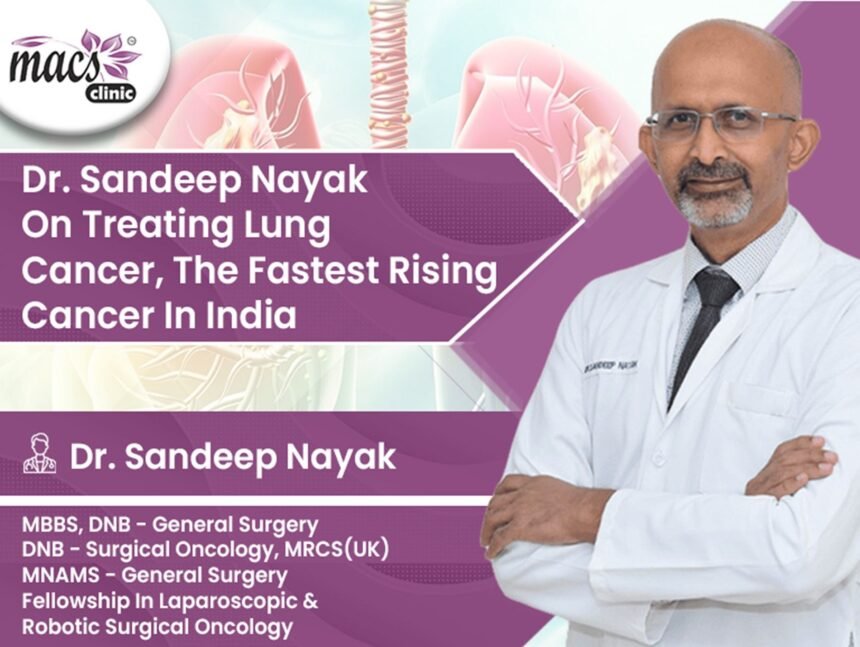As per the ICMR, India will record a 7-fold in lung cancer cases in a couple of years. Also, most lung cancer cases belong in the age group of 50s and beyond with the diagnosis being at an advanced stage. Dr Sandeep Nayak shares his views on treating lung cancer and improving their survival rates.
In India, lung cancer is the most frequently seen type among males. Lung cancer occurs because of the uncontrolled growth of abnormal cells in either one or both lungs. The lungs are essential for the distribution of oxygen throughout the body. But the presence of abnormal cells in the lungs hampers the functioning of healthy lung tissue properly. Lung cancer begins in the airway lining and is detected in an advanced stage.
Dr Sandeep Nayak is one of the finest oncologists in India who provides extensive and specialized cancer treatment in Bangalore. Furthermore, he has significant expertise in recognizing lung and other pulmonary issues ahead of time, resulting in remarkable results in lung cancer treatment in Bangalore.
Regular lung cancer treatments are surgery, chemotherapy, and radiotherapy. In addition, targeted therapy and immunotherapy, which are newer treatments, are occasionally used, but mainly for the later stages of the disease.
Dr Sandeep Nayak offers his patients cutting-edge and thorough lung cancer treatment. The treatment protocol depends upon the type and stage of lung cancer, the strength of the lungs, and the patient’s overall health.
The most common types of lung cancer are Small-cell lung carcinoma (SCLC) and Non-small-cell lung carcinoma (NSCLC). Small-cell lung carcinoma is also known as oat-cell carcinoma. It spreads quickly and has few visible symptoms at first. Small-cell lung cancer is aggressive and spreads fast. It is diagnosed after its spreads outside the lungs. The incidence of small-cell lung carcinoma is lower than non-small-cell lung cancer.
Small-cell lung cancer (SCLC) treatment consists of chemotherapy, and radiotherapy as it is usually not operable.
On the other hand, Non-small-cell lung carcinoma (NSCLC) includes adenocarcinoma, squamous cell carcinoma, bronchioloalveolar cell carcinoma, large cell carcinoma, and others. Surgery is the most preferred treatment for NSCLC.
Dr Sandeep Nayak elaborates on the treatment given to patients diagnosed with non-small cell lung cancer depending upon the stage of cancer. Patients with stage 1 NSCLC undergo surgery to remove a small portion of the lung, followed by chemotherapy if there is a chance of recurrence. Patients with stage 2 NSCLC need to undergo surgery to remove some part of the lungs or all the lungs, along with chemotherapy. Patients with Stage 3 NSCLC are recommended a combination of chemotherapy, surgery, and radiotherapy. In contrast, patients with stage 4 NSCLC must undergo chemotherapy, radiotherapy, targeted therapy, and immunotherapy per the doctor’s advice. Surgery is not offered for stage 4 cancers.
Surgery is one of the most preferred options to treat lung cancer, especially during the early stage. Therefore, the treating doctor will consider removing the tumor and surrounding lung tissue to treat patients with early-stage cancer. Yet, the tumour’s location, whether near the vital structures or likely to affect them, is also significantly considered.
Dr Sandeep Nayak prefers VATS lobectomy, video-assisted thoracic surgery (VATS), and robotic surgery for treating lung cancer as these are minimally invasive procedures, if suitable. As a result, the patient recovers well fast. However, surgery suits lung cancer patients with minimal medical issues and healthy lung function. Lung cancer patients treated through minimally invasive surgical procedures can be discharged from the hospital in 3 -4 days and resume work within 3 to 4 weeks.
Dr Sandeep Nayak states apart from smoking, tobacco use or second-hand smoke can cause lung cancer; the other causes of lung cancer include airborne pollutants, asbestos, arsenic, or radon, consumption of specific nutritional supplements such as beta carotene, and a personal or family history of lung cancer. Detection of lung cancer occurs when it is at an advanced stage. Hence, he advises people to adopt a healthy lifestyle and avoid cancer.







